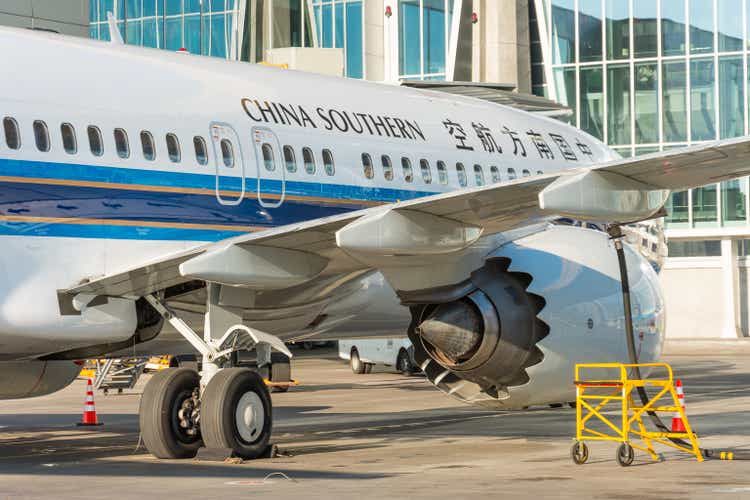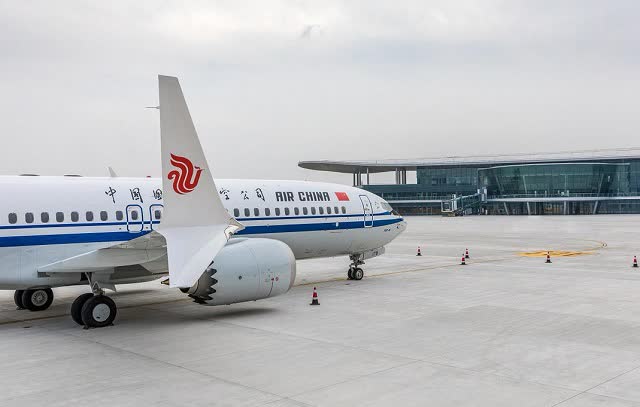aapsky/iStock Editorial via Getty Images
Shares of The Boeing Company (NYSE:BA) traded significantly higher following the news that the FAA had approved Boeing’s inspection and rework plan for the Boeing 787. This is a significant milestone as it brings Boeing a step closer to delivering Dreamliner aircraft and improve its balance sheet and line of business. The next day, however, Boeing stock prices came under pressure, which I discuss in this report.
Mounting Tensions with China Hit Boeing Stock
There is little doubt that the visit of House Speaker Pelosi to Taiwan was reason for Boeing share prices to come under pressure. The relation between China and U.S. has been under pressure for some time. President Obama intensified ties with countries surrounding China to increase its influence in Southeast Asia, while President Trump engaged in a trade war with China and President Biden did not do much to resolve the trade dispute.
The decision by House Speaker Pelosi to visit China adds even more oil to the fire. In an attempt to reduce tension, the White House has added that its One China policy remains unchanged but as expected China was not pleased with the visit. In response, it launched the biggest ever military drills around Taiwan firing missiles and crossing the median line of the Taiwan Strait. It is a move that brings the tension between China and the U.S. to a new high or low, depending on the way you look at it. What is rather clear at this point is that the current White House administration does not seem to be able to de-escalate or prevent steps such as a sensitive visit to Taiwan from the House Speaker that would increase tension with China. One of the companies that is suffering the pain of this tension is Boeing and its share prices tanked in response.
The Biggest Boeing Salesman
In 2015, President Obama said that he was Boeing’s second biggest salesman after the CEO of the company and in some way that makes sense. Boeing on any normal day is the country’s biggest exporter supporting many jobs within the U.S. and it is in the best of interest of any administration and the U.S. economy to facilitate Boeing where possible on the international stage. The current and previous administration have yet to do anything that would promote Boeing outside of the US. Normalizing ties with China should have been the first step, but the opposite is happening.
Boeing Sales Momentum in China Vanished
Air China Boeing 737 MAX (The Boeing Company)
Boeing’s sales momentum in China has almost completely vanished. In 2018, I explained that while China had imposed tariffs on commercial aircraft, but these did not include the in-demand aircraft such as the Boeing 737 MAX, Boeing 787 and Boeing 777. Following the two crashes with the Boeing 737 MAX, the Civil Aviation Authority of China was one of the first to ground the Boeing 737 MAX, a move that likely had some political roots and shifted the aviation regulatory gravity point. The same authority became the last major regulator to outline steps that would allow the Boeing 737 MAX back in service and to date none of the aircraft did return to service.
To Boeing, that is a problem. Boeing is often criticized for not being able to clear out the inventory of Boeing 737 MAX that at its peak was around 450 jets. The reality is that a third of those 450 jets is destined for Chinese customers and with no approval in China to fly the jet yet the pool of aircraft that you can deliver is much smaller. The tension between the US and China as well as the current travel environment with respect to COVID-19 with rapid openings and closings of regions have also led to Boeing de-risking China from its delivery and production plan essentially not executing on a planned increase in production rate. So, the tension that already existed was already costing Boeing and the Taiwan visit has not had any positive contributions to the prospect of a MAX return in China.
Last month, a set of Chinese state owned airlines also bought almost 300 single aisle jets from competitor Airbus (OTCPK:EADSF, OTCPK:EADSY) a painful thing when considering that Boeing has 150 jets waiting for delivery to Chinese customers. It wanted to execute a production rate increase that would make almost 100 jets production slots available for the Chinese market annually.
Boeing Wins Are Limited
Boeing is also not making up for the loss in orders at this stage. Increased tensions surrounding Taiwan have driven sales for defense contractors. Lockheed Martin (LMT) received a $62 billion ceiling contract that included prospective sales to Taiwan. Boeing only booked $798 million in contracts for the Taiwan Harpoon Coastal Defense System according to data analytics tools from The Aerospace Forum. For comparison purposes, a pool of 150 Boeing 737 MAX is valued nearly $8 billion at base value and in the coming 20 years there is an 8,500 market opportunity for commercial aircraft in China.
So, one out of every five deliveries are destined for China and currently that is a market that is hardly accessible for Boeing. Boeing is not making up for the lost sales in Taiwan as the defense contracts are granted to other companies and China Airlines, the flag carrier of Taiwan, is far smaller than the state-owned Chinese airlines due to the absence of major domestic market. The only way in which Boeing could reduce the losses a bit is if it selected as the supplier for the replacement of the Airbus A330-300 of which China Airlines has 22 in its fleet. A replacement order would be valued around $3.3 billion depending on the selected aircraft type and continues to show Boeing is losing more than it can win from the current situation.
Conclusion: Tense, But BA Stock Remains Attractive
The current situation is a slam to Boeing and the company’s effort to get the 737 MAX back in service in China. What we are seeing is that the current and previous administration have been unable to translate the sales potential to actual sales for Boeing and at times things have in fact been counterproductive and the lost sales are not made up for in Defense or commercial aircraft sales in other parts of the world. Nevertheless, I do believe that over the longer-term, China does need Boeing to support its travel market and aircraft manufacturing industry.


Be the first to comment